Educators
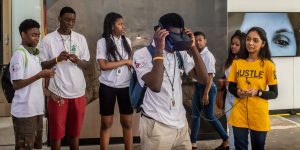
Curators’ Conversation
Ralph Borland, Cezanne Charles, Olga Stella, Antajuan Scott, Mark Sullivan, Devon Akmon
Take a look into the process of planning our third exhibition FUTURE PRESENT and hear from the panel of curators to get an overarching view of our subthemes. We will also answer questions from the Science Gallery Community.
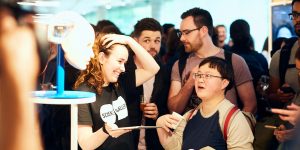
THE INVISIBLE REMAINS OF CARROWKEEL
An exploration of ancient genetics and the history of neolithic tombs as featured in NATURE in June 2020 by Trinity College Dublin geneticist Lara Cassidy (IE)
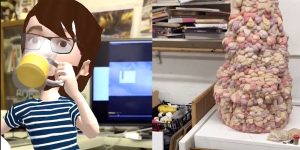
INVISIBLE Studio visits with Andy Holden and Thijs Biersteker
Andy Holden (UK) and Thijs Biersteker (NL)
Join us for a behind-the-scenes studio visit with INVISIBLE artists Andy Holden (UK) (INVISIBLE / DARK MATTER) and Thijs Biersteker (NL) (INVISIBLE - Gravitational lensing)
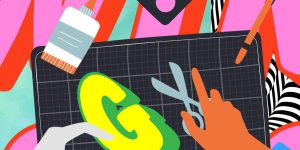
HOLD ON TO THE GOOD THINGS, IMAGINE THE BEST THINGS
An opportunity to reflect on COVID-19 and its effects on society, and speculate on what comes next. What roles do science, technology and art play here?
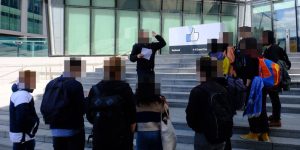
An Online Tour of Dublin’s Tech Infrastructure
Dublin is host to the European headquarters of many of the most powerful and influential tech companies of the modern era, and has become an important strategic location within the context of debates surrounding data sovereignty, privacy and security. By connecting our own personal interactions on digital platforms to the corporate offices in the city centre and to the data centres that surround the city, this tour critically engages with these debates, whilst also reflecting on our relationship with our personal data as it passes through the many visible and invisible networks that surround us.
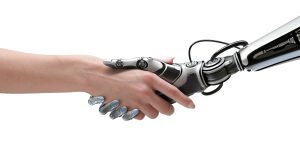
Citizens' Think-in on Artificial Intelligence
Artificial Intelligence (AI) is playing a growing role in our lives. Machine learning tools help determine the ads you see online, the news you read and the products you purchase. Every time we send a text, use a credit card or sync a wearable device we are sharing personal information about ourselves. But what are the social consequences of AI? How is our information being used? Who is setting the policies and regulation? And how can AI affect our privacy and civil liberties?
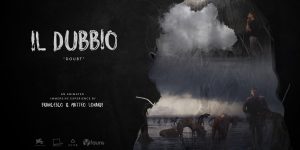
The Art of Doubt
Matteo Lonardi, Velasco Vitali, Michel Reilhac, Marco Faini
Doubt has played a critical role in both society and art, since the time of the renaissance, when it first entered the public sphere as a distinct concept. Ca’ Foscari University of Venice researcher Marco Faini will explain the concept of doubt, while Matteo Lonardi, Francesco Lonardi, and Velasco Vitali will speak about the role of doubt in the artistic process from Leonardi Da Vinci to contemporary artists.
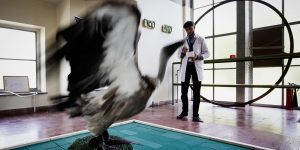
Earth Water Sky Artist Residency
Haseeb Ahmed (US)
2020 Earth Water Sky artist in residence Haseeb Ahmed (Sky) will present his film “The Wind Egg” and discuss his body of work, notably on particulates and the particular narratives carried by the wind, which is also the subject of his residency at Science Gallery Venice. The presentation will be followed by a question and answer session open to the public, moderated by residency producer/curator Ariane Koek.
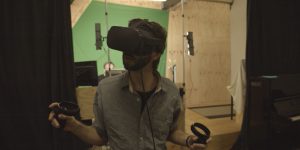
Fertile Methodologies
Tactical Space Lab (AU)
The Tactical Space Lab is a research initiative focusing on the intersection of art and technology. We are committed to expanding the diversity of stories and voices represented through new technologies via collaborative projects and educational programs across all ages, with the aim of ‘demystifying’ VR, not just for artists, but for the wider community.
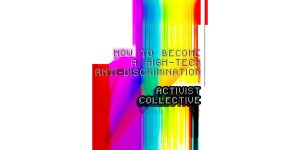
Nushin Isabelle Yazdani und Internet Teapot (Karla Zavala und Adriaan Odendaal): [d/r]econstructing AI - dreams of visionary fiction and zine-making
How to Become a High-Tech-Anti-Discrimination Activist Collective
In diesem Workshop untersuchen wir die Strukturen hinter algorithmischen Entscheidungsfindungssystemen. Es wird diskutiert, warum ihr Design normativ ist und wie KI-Systeme die strukturelle Diskriminierung verstärken.

LAB ON STAGE (Adriana Torres Topaga, Martyna Lorenc and Andrea Maria Handler): Phantom Data in our bodies and imagination
How to Become a High-Tech-Anti-Discrimination Activist Collective
Dieser Workshop verfolgt einen performativ-künstlerischen Ansatz. Unser Ausgangspunkt ist die Verkörperung von Vorstellungs- und Wahrnehmungsprozessen.

Astrid Mager und Hong Phuc Dang: How to create your own AI device with SUSI.AI - An Open Source Platform for Conversational Web
How to Become a High-Tech Anti-Discrimination Activist Collective
Der Workshop stellt SUSI-Komponenten wie den Technologiestack von SUSI, seinen Wiki-ähnlichen Skill-Editor und Hardware-Prototypen vor; die Teilnehmer*Innen arbeiten zusammen, um einen einfachen Bot zu erstellen, und um neue Fähigkeiten zu entwickeln und testen. Eine Reflexion über Datenverzerrung und algorithmische Diskriminierung lädt dazu ein, gemeinsam über die Schaffung diskriminierungsfreier digitaler Technologien nachzudenken.

Doris Allhutter: “When I encountered discriminating IT-systems and did not want to take it anymore” - deconstructing affective entanglements in society-technology relations
How to Become a High-Tech Anti-Discrimination Activist Collective
Dieser Workshop wendet die dekonstruktive Methode des Mind Scripting an, um den Einfluss zu verstehen, den selbst Technologien, die wir ablehnen, auf uns haben können. Anhand unserer eigenen Erinnerungen als experimentelle Ressource werden wir untersuchen, wie sich Diskriminierung und Privilegien in unseren Praktiken materialisieren. Dies zielt darauf ab, kollektive Handlungsfähigkeit und Aktivismus zu entwickeln.

Safiya Umoja Noble: Algorithms of Oppression - How Search Engines Reinforce Racism
How to Become a High-Tech Anti-Discrimination Activist Collective
Die Informationslandschaft verändert sich rasch, da neue Anforderungen die Investitionen in digitale Technologien erhöhen. Kritische Wissenschaftler*Innen zeigen jedoch immer wieder auf, wie viele Technologien von Werten geprägt und durchdrungen sind, die nicht unparteiisch und körperlos sind oder denen es an Positionierungsfähigkeit fehlt. Technologien haben rassen-, geschlechts- und klassenpolitische Bedeutung. In diesem Vortrag wird Dr. Safiya Noble über ihr kürzlich erschienenes Buch „Algorithms of Oppression“ und den Einfluss der Technologie auf die Öffentlichkeit sprechen.

Lisa Nakamura: Estranging Digital Racial Terrorism After COVID
How to Become a High-Tech Anti-Discrimination Activist Collective
In diesem Vortrag wird argumentiert, dass COVID-19 eine beschleunigte Migration zu digitalen Netzwerken erzwang. Dieses neue Publikum wurde sowohl mit rassistischen und traumatisierenden digitalen Inhalten auf den Plattformen konfrontiert, als auch mit neuen Möglichkeiten für Kritik und Widerstand.

How to Become a High-Tech Anti-Discrimination Activist Collective
IFG-LIT (AT)
Neue Technologien sind in alle Aspekte unseres Lebens eingedrungen und versprechen eine breite Palette an Verbesserungen und Erleichterungen. Allerdings funktionieren Algorithmen, auf welchen diese Technologien basieren, im Gegensatz zur allgemeinen Wahrnehmung weder in neutraler Weise, noch behandeln sie alle Leute gleich.
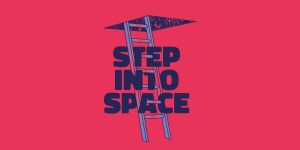
Space Art Tour – Educators Edition
Ars Electronica (AT), Ciência Viva (PT), Leiden University (NL)
Sehen Sie sich die Weltraumkunst beim Ars Electronica Festival an und lernen Sie verschiedene Tools für LehrerInnen und PädagogInnen kennen. Der Weltraum und das Universum werden als Inspirationsquelle genutzt.
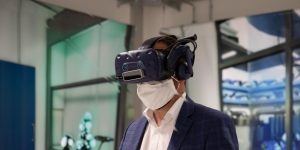
Robots Talking To Me
LIT Robopsychology Lab, Johannes Kepler University (AT)
Wie sollen Roboter mit Menschen kommunizieren? Welche Stimme sollen KI-Assistenten haben, damit wir ihnen vertrauen können? Müssen wir überhaupt auf Zeichen und Worte von Robotern hören oder sollen wir immer selbst das Sagen haben? Unter dem Titel Robots Talking to Me präsentiert das *LIT Robopsychology Lab* vier Installationen, die psychologische Fragen von Mensch-Maschine-Beziehungen erlebbar machen und zum Mitmachen einladen.
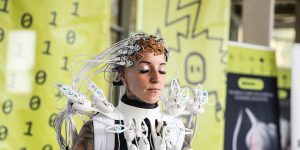
The Pangolin Scales
Thomas Faseth (AT), Harald Pretl (AT), Christoph Guger (AT), Anouk Wipprecht (NL)
The Pangolin Scales demonstriert die weltweit erste 1.024-Kanal Gehirn-Computer Schnittstelle (engl.: Brain-Computer Interface; kurz: BCI), welche Informationen des menschlichen Gehirns mit einer bisher nicht existenten Auflösung extrahiert, um damit ein interaktives, modisches Kleid zu steuern.
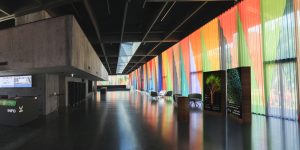
Treeversity
Johann Höller (AT), Thomas Lorenz (AT), Florian Gruber (AT), Ursula Niederländer (AT), Tanja Illetits-Motta (AT), Raphael Blasi (AT), Andreas Rösch (IT), Stefan Küll (AT)
Treeversity focuses on the relation between Big Data and data visualization to convey complex information at a glance. A mirror of the university’s inner workings, diligently recording success, failure and evolution. A portrait of its life in the form of a tree. Courses, grades and exams become branches, creating many different trees. Fully grown or nascent, withering or growing erratically. Treeversity shows the university as a forest, providing a tool to analyze its mechanisms at the same time.


